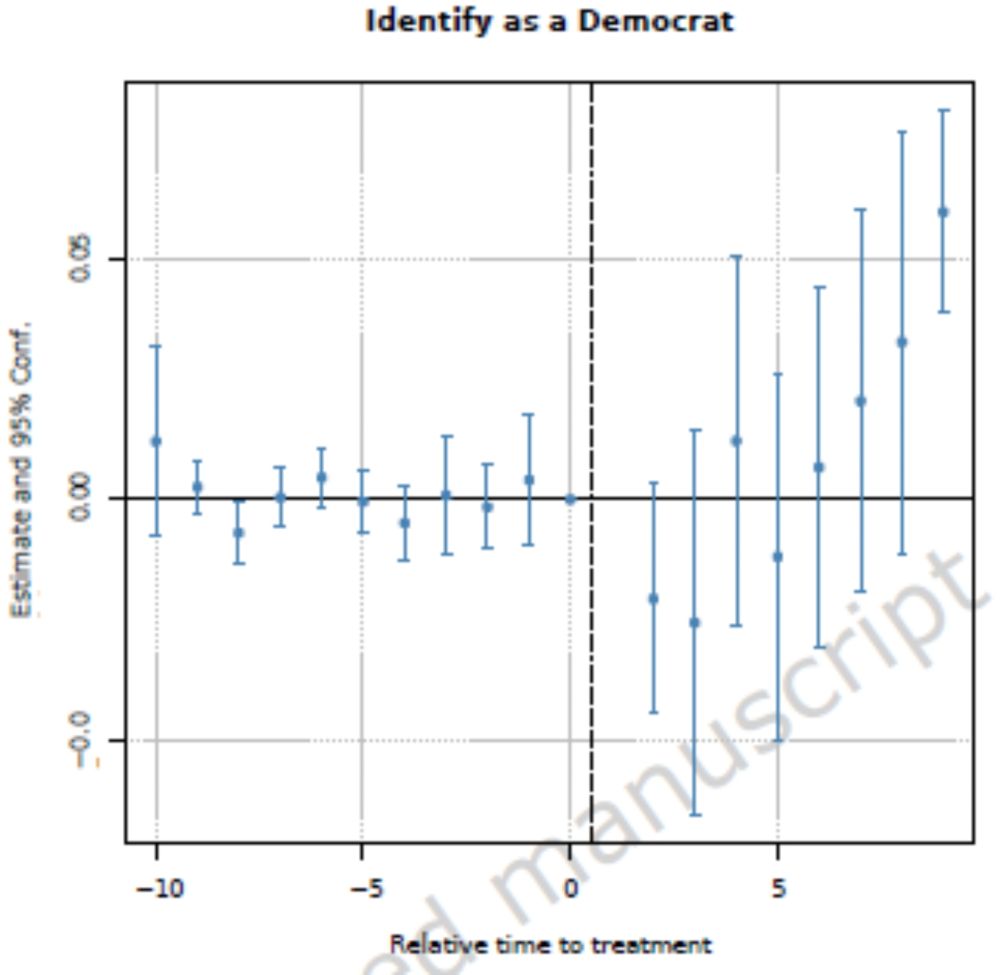https://www.kcl.ac.uk/news/study-finds-well-designed-benefits-dont-discourage-people-from-working
Read the full paper here 👉 papers.ssrn.com/sol3/papers.cf…
And see the coverage by @kingscollegelondon.bsky.social:t.co/N4kE3L0mXl
27.09.2025 10:31 — 👍 0 🔁 0 💬 0 📌 0
Interpretation:
Well-designed, work-neutral disability benefits do not reduce labor market participation.
The small positive effects under strict assessors likely reflect filtering out strategic claims, not large behavioral responses.
27.09.2025 10:31 — 👍 0 🔁 0 💬 1 📌 0
📊 Results:
•Expanding access (mental health) → no reduction in employment, if anything small positive effects
•Restricting access (minor physical disabilities) → no gains in employment
•Stricter assessors → small but significant ↑ in employment
27.09.2025 10:31 — 👍 0 🔁 0 💬 1 📌 0
Using UK panel data (2009–2019) & quasi-experimental variation from the DLA→PIP reform, we estimate employment effects for:
•Mental health conditions (gained eligibility)
•Minor physical disabilities (lost eligibility)
•Regions with stricter vs lenient assessors
27.09.2025 10:31 — 👍 2 🔁 0 💬 1 📌 0
PIP is unique. It covers the extra costs of disability but has no earnings tests & no work incapacity requirements. This design lets us isolate pure income effects without substitution distortions.
27.09.2025 10:31 — 👍 0 🔁 0 💬 1 📌 0
Most disability benefits combine income support + work restrictions. That makes it hard to know: do people work less because they can, or because policy forces them not to?
27.09.2025 10:31 — 👍 0 🔁 0 💬 1 📌 0
🚨 New working paper alert!
As part of our Horizon Europe BENEFITS project, @bkleinteeselink.bsky.social and I study whether disability benefits necessarily discourage work — using the UK’s Personal Independence Payment (PIP) reform as a natural experiment.
🧵
27.09.2025 10:31 — 👍 3 🔁 0 💬 1 📌 1
Takeaway: politics matters in private life—but signaling openness can bridge divides. Surfacing “tolerance” on platforms might reduce partisan sorting
05.09.2025 11:51 — 👍 0 🔁 0 💬 1 📌 0
Gender splits: Men penalized “progressive” profiles; women rewarded them. Women also showed a stronger in‑party preference than men
05.09.2025 11:51 — 👍 0 🔁 0 💬 1 📌 0
Counter‑stereotypes: Conservatives were more open to out‑partisans who defied stereotypes (e.g., White/Traditional/Non‑veg Labour). Labour respondents tended to prefer stereotypical Tories—except they liked progressive Tories
05.09.2025 11:51 — 👍 0 🔁 0 💬 1 📌 0
But tolerance is even stronger. Profiles saying “open to match with anyone” gained +19.9 pp—the largest effect; similar in size to being attractive. It’s not just avoiding “No Tories/No Labour” profiles. Even among co‑partisans, people preferred tolerant over intolerant profiles
05.09.2025 11:51 — 👍 0 🔁 0 💬 1 📌 0
Headline: Co‑partisanship is powerful. Co‑partisan profiles were picked +18.2 pp more often than out‑partisans
05.09.2025 11:51 — 👍 0 🔁 0 💬 1 📌 0
We ran a visual conjoint with 3,000 UK daters (18–40). Profiles varied party (Labour/Tory), a clear “tolerance” cue, ideology, race, education, diet, height, and facial attractiveness—using real photos to mirror apps
05.09.2025 11:51 — 👍 0 🔁 0 💬 1 📌 0

🚨📢 New paper out in @psrm.bsky.social with Yara Sleiman & Paul Dolan: “Sleeping with the enemy: partisanship and tolerance in online dating”. How much do politics shape who we swipe?
05.09.2025 11:51 — 👍 6 🔁 5 💬 1 📌 0
Just out! ERNOP's practitioner summary of my paper with @gmelios.bsky.social, showing that 🇺🇸 Partisans reduce charitable giving by ~4.5 % when their own party is in power, as faith in government crowds out private help, whereas opposition to government motivates private giving.
tinyurl.com/ernop1
30.06.2025 08:58 — 👍 1 🔁 1 💬 1 📌 0
An interesting collection of opinions @theguardian.com on whether and how the 2020 BLM protests change the world. Covers our work with @bkleinteeselink.bsky.social on @polbehavior.bsky.social. Link on the first comment
29.05.2025 13:15 — 👍 2 🔁 1 💬 1 📌 0
New paper out in @polbehavior.bsky.social. We focus on an important and timely question. Do protests matter? Do they drive social change? @bkleinteeselink.bsky.social summarises our work nicely in the following thread.
04.03.2025 16:06 — 👍 6 🔁 1 💬 1 📌 0
Great summary of our paper!
14.02.2025 14:24 — 👍 1 🔁 1 💬 0 📌 0

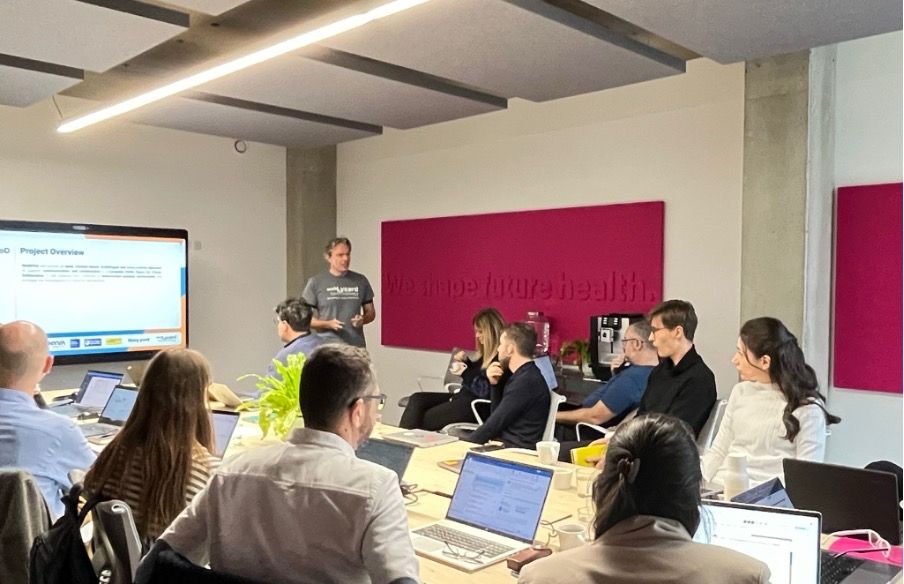
Very excited to be in Vienna yesterday for the kick-off meeting of our new Horizon Europe grant "MultiPod" on promoting political participation and creating the "Public Space for Citizen Deliberation" in Europe!
10.12.2024 10:18 — 👍 1 🔁 0 💬 0 📌 1
Check out our new publication. Excellently summarised by @bkleinteeselink.bsky.social
13.11.2024 10:58 — 👍 1 🔁 0 💬 0 📌 0
Thanks to @bkleinteeselink.bsky.social for the great collaboration on this project. Looking forward to continuing this line of research! #PoliticalScience #Polarization #AmericanPolitics
18.09.2024 10:48 — 👍 0 🔁 0 💬 0 📌 0
Why do these findings matter? A lack of trust in government when the "other side" is in power can hinder democratic functioning. It makes it harder for citizens to hold their own party accountable and can lead to efforts to undermine opposing governments. 🏛️
18.09.2024 10:47 — 👍 0 🔁 0 💬 1 📌 0
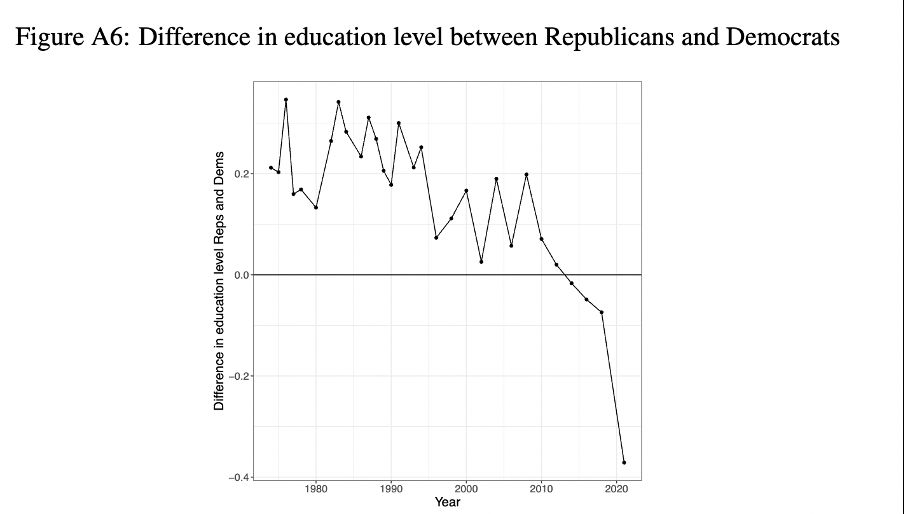
Why? Highly educated people show a stronger president-in-power effect, and they've increasingly shifted towards identifying as Democrats over time.
18.09.2024 10:47 — 👍 0 🔁 0 💬 1 📌 0
Citizen Erased: Contrary to popular belief, we found no evidence that this effect has grown faster among Republicans. If anything, it may have increased slightly more for Democrats in recent years.
18.09.2024 10:46 — 👍 0 🔁 0 💬 1 📌 0
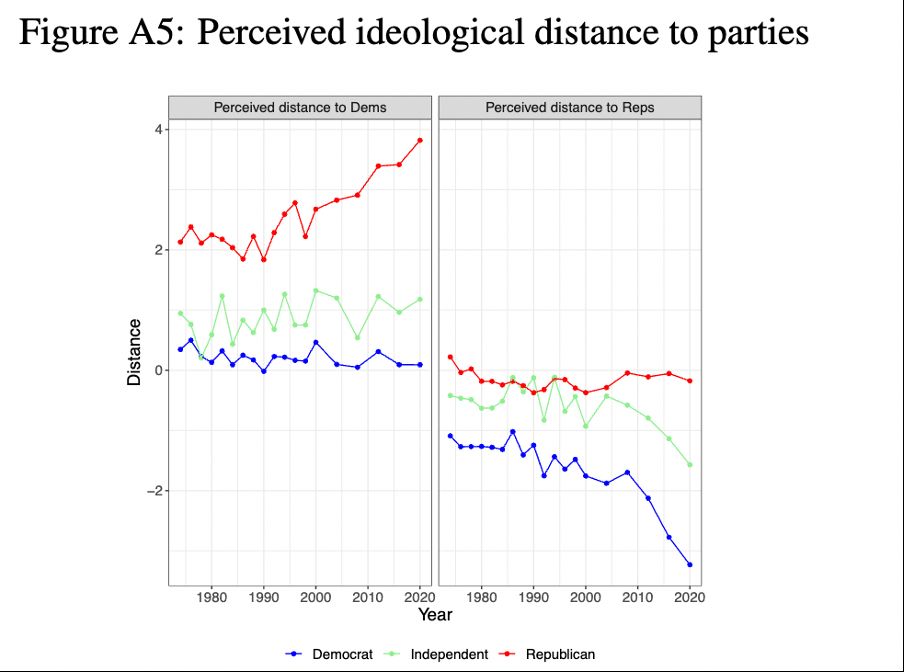
Moreover, perceived ideological distance to the other side has increased:
18.09.2024 10:46 — 👍 0 🔁 0 💬 1 📌 0
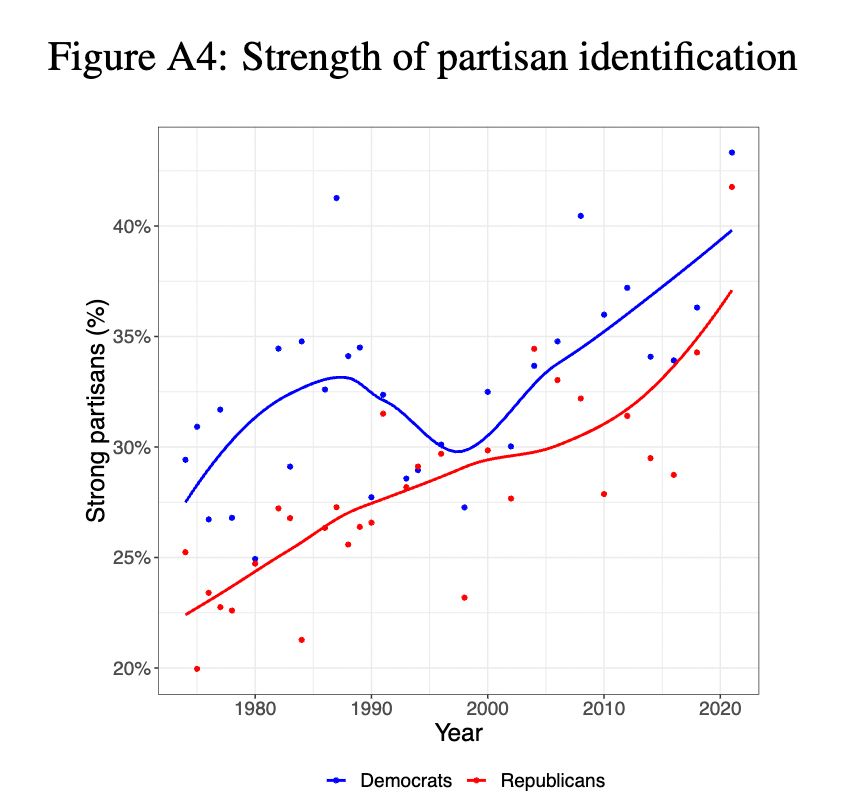
Megalomania: The increase is driven by intensifying partisan identification:
18.09.2024 10:46 — 👍 0 🔁 0 💬 1 📌 0
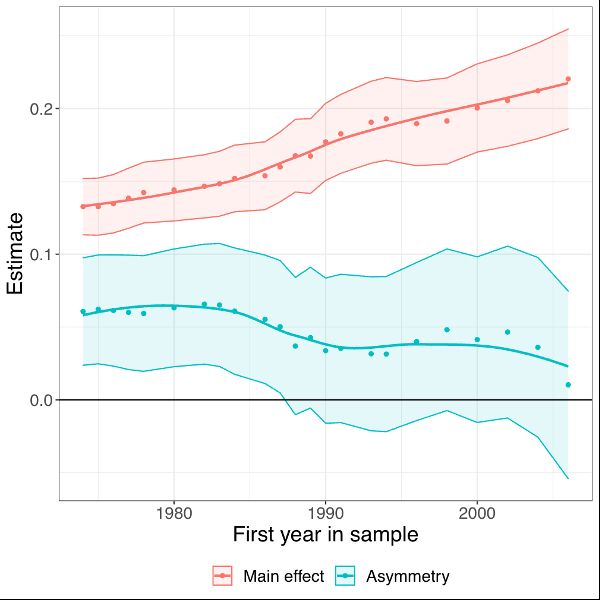
Darkshines: Fast forward to 2021. The effect has increased by 2 to 4 times! When one’s party loses the presidency, partisans' trust in government plummets. When they win, it soars. The increase is illustrated by the red line below:
18.09.2024 10:46 — 👍 0 🔁 0 💬 1 📌 0
Bliss: Let's rewind to simpler times. In the 1970s, the "president-in-power effect" was relatively small. Although larger for Republicans, both sides had relatively high levels of trust in government, regardless of who held the White House.
18.09.2024 10:45 — 👍 0 🔁 0 💬 1 📌 0
PhD candidate at the LSE @lse-ei.bsky.social and affiliate
@lsedatascience.bsky.social | Political identities, methodology, note-taking and running
https://www.elenapro.eu/
PolSci & PolComm. Me gusta hablar de música, de cine y de política a ratos.
Political Science Research and Methods: The journal of the European Political Science Association, edited by John Griffin, published by Cambridge University Press
An interdisciplinary journal associated with the EPOVB section of @APSA.bsky.social. Edited by Chris Karpowitz & Jessica Preece, @BYU
https://www.springer.com/journal/11109
Associate Professor in Comparative Politics - University of Reading; Co-Director @poalab.bsky.social; UKRI Future Leaders Fellow;
Visiting: DSI-London School of Economics. Web: https://miriamsorace.github.io
An academic collaboration between University of Reading, London School of Economics, and University of Southampton, designed to advance the research, teaching, and practice of public opinion and political behaviour measurement and analysis
poal.co.uk
Professor of political science at Stanford. State formation, religion, political parties, Europe, etc. Amateur electrician.
Asst. Professor, London School of Economics
Fellow in Democratic Innovations, Yale ISPS
Studying lotteries in democracy and tech, HPE, political economy; turning history into data
acirone.com
Assistant Prof at UC Irvine. PhD in Political Science from UCLA. #UCPPFP Political Psychology, Intersectionality, Social Movements
Professor, international relations, Spartan & Cyclone alumni, studies conflict, institutions, and disasters; mother of awesome rehabilitation counselor
Assistant Professor of Political Science at CU Boulder. Director of the Barney Ford Lab. UC Riverside PhD. Princeton Postdoc. Dodgers fan. ⚾
Associate Professor at Polsci Leiden. Associate Editor at International Studies Review. Trained at Indiana University and Sciences-Po. IR, FPA, security, migration politics, India. https://www.universiteitleiden.nl/en/staffmembers/nicolas-blarel#tab-1
Associate Professor, Government Department, LSE
Indian politics, state capacity, status politics, historical political economy
www.pavisuri.com
Editor at http://broadstreet.blog
Director of Policy and Insight at @powertochange.org.uk
Interests include: UK politics, trust, communities, localism, democratic reform, and inequality.
research psychologist. beliefs, AI, computational social science. prof at american university.
Associate Professor, Psychology @cornelluniversity.bsky.social. Researching thinking & reasoning, misinformation, social media, AI, belief, metacognition, B.S., and various other keywords. 🇨🇦
https://gordonpennycook.com/
Assistant Professor of Political Science. African Politics, Nationalism, and Democracy. Also quilting. Lots of quilting.
Stein Rokkan Chair in Comparative Politics, EUI. President-Elect, @epssnet.bsky.social. FBA, FRSA. Democracy, parties, elections, electoral systems etc. Live music. COYI
Oahu, Hawaii🏡 | @ConnCollege | @umsbe | @uni_tue |
@UniBonn Economics MRes | Recovering sports data user...
https://sites.google.com/view/kcolombe/

